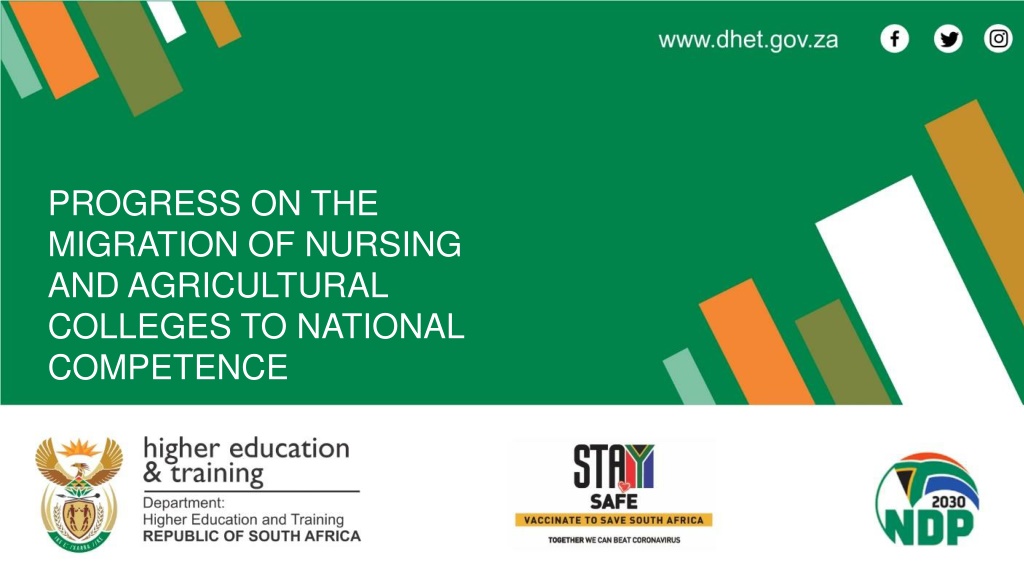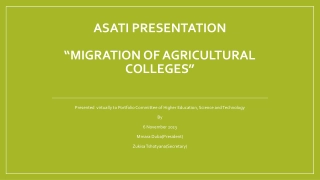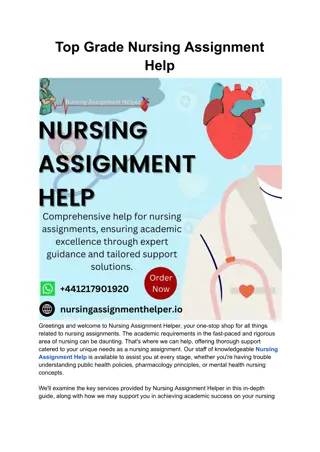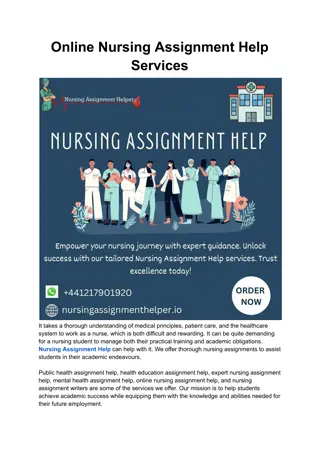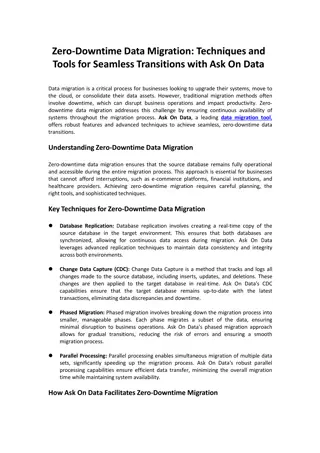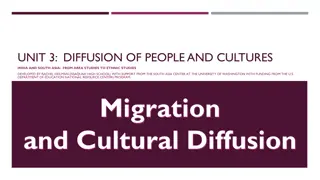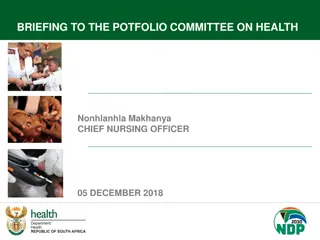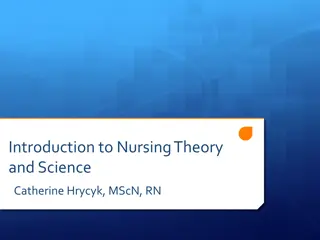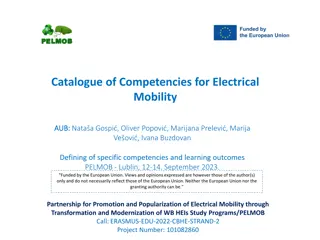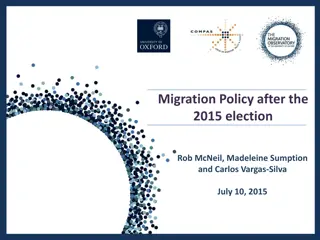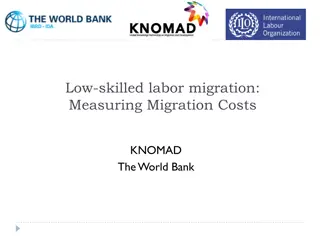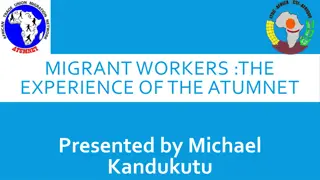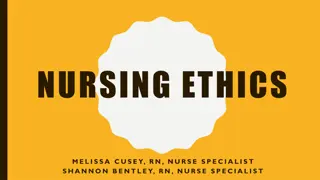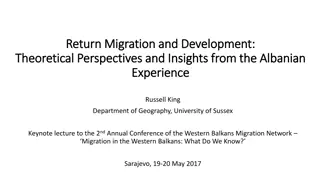Progress on Migration of Nursing and Agricultural Colleges to National Competence
The progress report discusses the migration of nursing and agricultural colleges to national competence, highlighting updates on governance, administration, and incorporation into higher education. It outlines the background, purpose, status, and presentation outline of this migration process, emphasizing the collaboration between relevant departments and entities to ensure compliance with legislative frameworks and educational standards. The content underscores the importance of aligning nursing colleges with post-school education requirements to enhance the quality of nursing education programs offered.
Download Presentation

Please find below an Image/Link to download the presentation.
The content on the website is provided AS IS for your information and personal use only. It may not be sold, licensed, or shared on other websites without obtaining consent from the author. Download presentation by click this link. If you encounter any issues during the download, it is possible that the publisher has removed the file from their server.
E N D
Presentation Transcript
PROGRESS ON THE MIGRATION OF NURSING AND AGRICULTURAL COLLEGES TO NATIONAL COMPETENCE
PURPOSE PURPOSE To provide an update on the migration of nursing and agricultural colleges to national competence. To give an overview on the state of nursing and agricultural colleges in relation to governance and administration.
STATUS OF INCORPORATION OF NURSING COLLEGES INTO HIGHER EDUCATION Portfolio Committee for Higher Education and Training 21 November 2023 Dr N.J.MAKHANYA Chief Nursing Officer National Department of Health
PRESENTATION OUTLINE Introduction Context Progress to date Conclusion
INTRODUCTION On 6 July 2016, the Minister of Higher Education issued a Government Notice (Government Gazette No.40123) stipulating December 2019 as a last date of registration of all programmes leading to higher education qualifications that were not compliant with the prescripts of the higher education and training. The Government Notice provided an impetus to the two departments (NDoH and DHET) together with the SANC and CHE to accelerate finalisation of their legislative mandates to ensure integration of nursing colleges into post school system in line with the provisions of the amendment Act. Otherwise, nursing colleges would be precluded from offering nursing education programmes (both undergraduate and specialist qualifications) except to teach- out legacy nursing qualifications. Unless they were recognised as national institutions in terms of the legislation that govern public institutions offering higher education qualifications, nursing colleges would remain outside the legislative framework for the post-school education and training system.
CONTEXT: PROTOCOL AGREEMENT BETWEEN THE NDOH AND DHET Protocol Agreement in terms of Intergovernmental Relations Framework Act , 2005 ( Act No. 13 of 2005) The Department of Higher Education and Training and the National Department of Health have entered into an agreement in terms of section 35(1) of the Intergovernmental Relations Act, 2005 (Act No.13 of 2005) . The protocol commit both parties to work together in addressing educational shared responsibilities such as declaring the public nursing colleges as Higher Education Colleges, and any other responsibilities that may need collaboration between the two parties. Collaborate on transitional arrangements to be put in place so that nursing colleges can continue to operate until they are declared as higher education colleges, such as but not limited to creating an enabling environment for the accreditation of new qualifications on the Higher Education Qualifications Sub-Framework, registration of new qualifications on the National Qualifications Framework, recognition of new programmes by the South African Nursing Council and enabling the public nursing colleges to market and enrol students on the new qualifications.
CONTEXT: DESIGNATION OF NURSING COLLEGES Government Notice No. 42774 of 16 October 2019 In order to achieve the above objectives, as a transitional arrangement, the 10 recognised public nursing colleges, listed in the Schedule below, are hereby designated to offer Certificates, Diplomas and Bachelor Degrees in nursing, which are accredited and registered Qualifications Sub - Framework, from January 2020 until such time as they are declared as one of the institutional types contemplated in the Higher Education Act, 1997. on the Higher Education
STATUS ON OFFERING OF DIPLOMA IN NURSING PROGRAMME Province Nursing College Number of students Eastern Cape Lilitha College of Nursing 292 Free State Free State School of Nursing 170 Gauteng Gauteng College of Nursing 550 KwaZulu-Natal KwaZulu-Natal College of Nursing 310 Limpopo Limpopo College of Nursing 380 Mpumalanga Mpumalanga College of Nursing 70 Northern Cape Henrietta Stockdale Nursing College 30 (to commence Jan 2024) North West North West College of Nursing 90 Western Cape Western Cape College of Nursing 150 TOTAL 2042 8 Colleges are offering the 3-year Diploma in Nursing. Northern Cape will commence offering in January 2024. Colleges are producing more than 2000 students per year.
STATUS ON OFFERING OF ADVANCED DIPLOMA (BASIC) MIDWIFERY PROGRAMME Number of Students Province Nursing College Commencement Date Free State Gauteng KZN Limpopo Mpumalanga Free State School of Nursing Gauteng College of Nursing KwaZulu Natal College of Nursing Limpopo College of Nursing Mpumalanga College of Nursing 90 200 350 203 65 Jan 2024 Jan 2024 Jan 2024 Jan 2024 June 2024 North West Western Cape Total North West College of Nursing Western Cape College of Nursing 60 80 Jan 2024 June 2023 1368 From January 2024, there will be 7 public colleges offering the Advanced Diploma in Midwifery, producing 1368 midwives per year. The Eastern Cape and Northen Cape will commence offering in 2025.
STATUS OF ACCREDITED CLINICAL NURSE SPECIALIST PROGRAMMES Clinical Specialist Training Programmes: o Occupational Health Nursing: 3 Universities; 115 students o Midwifery: o Primary Care: o Critical Care: o Peri-operative Nursing: o Mental Health: o Emergency Nursing: o Ophthalmology Nursing: o Oncology & Palliative: o Nephrology: o Child Nursing: Non-Clinical: o Nursing Education: o Health Service Management: 7 Universities; 380 students 5 Universities & 2 Colleges; 245 students 4 Universities & 2 Colleges; 396 students 4 Universities & 2 Colleges; 192 students 1 University & 2 Colleges: 80 students 2 Universities & 1 College: 80 students 1 University; 1 College: Total 40 students 1 College: 20 students 1 University& 1 College: 50 students 1 University: 16 students 1 University &1 College:70 students 4 Universities; 180 students
CONCLUSION New nursing programmes are offered by 29 private institutions, 21 universities and 8 colleges. Towards ensuring that there is consistent supply of nurses for optimal performance of the health systems towards universal health coverage.
PROGRESS ON FUNCTION SHIFT OF PROGRESS ON FUNCTION SHIFT OF COLLEGES OF AGRICULTURE INTO COLLEGES OF AGRICULTURE INTO NATIONAL COMPETENCE NATIONAL COMPETENCE
Background In 2011, the Council on Higher Education, advised the Minister of Higher Education and Training that to deal with the challenges in the quality of qualifications offered by public colleges under provincial governance, they should be brought into a national competence under the Department of Higher Education and Training. Schedule 4 of the South African Constitution affirms tertiary education is a national competence In March 2014 Cabinet considered a joint memorandum from the Department of Agriculture, Forestry and Fisheries (DAFF), now DALLRD and the Department of Higher Education and Training (DHET) on the transfer of the functional competence for Colleges of Agriculture from a provincial to a national competence 14
Background Cabinet approved that a Joint Technical Task Team (JTTT) be established by the two Departments to develop mechanisms and plans for the transfer of Colleges of Agriculture from concurrent national and provincial legislative competence of DALRRD to national legislative competence under the governance of DHET DALRRD and DHET constituted a JTTT with detailed Terms of Reference prescribing the purpose and scope of work of the JTTT. 15
Background The JTTT recommended that the Colleges of Agriculture should be: - A joint national competency shared by DHET and DALRRD - Integrated into the Post-School Education and Training (PSET) system to ensure effective articulation with other PSET institutions and programmes - Established as autonomous Higher Education Colleges in terms of the Higher Education Act and appropriately named to reflect their vocational education and training mission - Governed under policy promulgated by the Minister of HESI with the concurrence of the Minister of ALRRD - Policy published in terms of the Higher Education Act, must include regulations on the funding and governance that underpin the functioning of the colleges - Established with the authority to take decisions and control over their own finances, with a governance model that includes independent on-site management for the colleges 16
Background On 2 September 2020 ESIEID Cabinet Committee approved that: Colleges of Agriculture should be declared as Higher Education Colleges under the Higher Education Act (101 of 1997, as amended) by the Minister of Higher Education, Science and Innovation, who has the legislative responsibility for the post-school education and training system Colleges of Agriculture should be transferred to a national competence, with funding and daily administrative processes to be interdepartmental/Ministerial protocol and specific policy ad regulations undertaken by DALRRD through DHET and DALRRD implement the processes required to give effect to the Colleges of Agriculture being established as Higher Education Colleges and be transferred to a national competence. 17
FUNDING OF COLLEGES OF AGRICULTURE Colleges of Agriculture have 3 sources of funding i.e. equitable share (PDAs), Comprehensive Agricultural Support Programme (CASP by DALRRD) under the pillar: College Revitalization Programme (CRP) and Programme 7 skills development funding. Some colleges have requested part of their revenue collection through their Provincial Treasuries.
STUDENT POPULATION Number of students registered Name of College Programme Per programme Total Diploma BAgric Diploma BAgric Diploma Advanced Diploma Diploma Diploma Diploma Diploma Diploma Diploma Diploma Diploma 100 29 219 257 369 60 319 189 181 178 283 207 179 191 Cedara 129 Elsenburg 476 Fort Cox 429 Glen Grootfontein Madzivhandila Owen Sithole Potchefstroom Taung Tompi Seleka Tsolo Total 319 189 181 178 283 207 179 191 2761
COURSES OFFERED Name of College Province Formal Qualification(Accredited by CHE) Diploma in Agriculture (NQF Level 6), B Agric (NQF Level 7 University of KwaZulu Natal) Diploma in Agriculture (NQF Level 6) Diploma in Agriculture (NQF Level 6), Forestry (NQF Level 6), Advanced Diploma in Forestry (NQF Level 7), Advanced Diploma in Animal Production (NQF Level 7), Advanced Diploma in Horticulture (NQF Level 7) Diploma in Animal Health (NQF Level 6) (Registered with SAVC) KwaZulu Natal Cedara Owen Sithole Fort Cox Eastern Cape Tsolo Grootfontein Madzivhandila Diploma in Agriculture (Small Stock) (NQF Level 6) Diploma in Agriculture: Animal Production (NQF Level 6),Diploma in Agriculture: Plant Production (NQF Level 6) Diploma in Agriculture: Animal Production (NQF Level 6), Diploma in Agriculture: Plant Production (NQF Level 6) Diploma in Agriculture in Mixed Farming (NQF Level 6) Diploma in Agriculture in Irrigation (NQF Level 6) Limpopo Tompi Seleka North West Potchefstroom Taung Diploma in Agriculture in Animal Production (NQF Level 6), Diploma in Agriculture in Crop Production (NQF Level 6) Diploma in Agriculture (NQF Level 6), B Agric (NQF Level 7 - Stellenbosch University) Free State Glen Western Cape Elsenburg
GOVERNANCE & ADMINISTRATIVE SUPPORT Governance Currently the governance models of the Colleges vary. Of the eleven Colleges, nine are entirely administered by the Provincial Departments of Agriculture and have limited institutional decision-making powers. One College, Fort Cox in Eastern Cape is a semi-autonomous College, and Grootfontein Agricultural Development Institute (GADI) reports directly to DALRRD for various historical and boundary reasons. All colleges have advisory councils/boards appointed by respective Members of Executive Council, and Minister of ALRRD with respect to GADI
IMPROVEMENT OF TEACHING & LEARNING Programme offered by the Colleges of Agriculture are higher education qualifications on the Higher Education Qualifications Sub-Framework, but also include a variety of skills training and vocational programmes accredited by AgriSETA (being phased out), All ATIs espouse the integration of theory and practice as their distinctive approach to teaching and learning. This integration is pursued through Work Integrated Learning (WIL) in the curriculum, and laboratories and workshops that facilitate practical application, and the engagement in some entrepreneurial activity on a piece of land specifically designated for this purpose, while others arrange for their students to participate by means of exhibiting in agricultural shows and expos. Two Colleges are accredited by QCTO as Skills Development Providers and Skills Assessment Centres, others are in the process of application.
STATE OF INFRASTRUCTURE Majority of these colleges were established many years ago, hence their infrastructure is either in poor condition or non-functional. Almost all the Colleges are in severe need for major infrastructure upgrade. The DALRRD initiated with the work of transforming and repositioning the Colleges of Agriculture through the Comprehensive Agricultural Support Programme (CASP) conditional grant since 2011. The College Revitalization Programme pillar aimed at improvement of status of colleges was implemented Currently DALRRD in collaboration with Colleges of Agriculture is developing the Colleges of Agriculture Infrastructure Master Plan (CAIMP). The Master Plan provides a framework for a determined effort to improve the teaching and learning, farming, lodging and recreation infrastructure within the 11 colleges of agriculture. This will allow the Colleges to significantly grow the graduate output and provide quality education and training through several infrastructure improvements that will be implemented over a number of years.
STATUS ON MIGRATION REFERENCE PROGRESS Agreement has been reached with five Provinces on the funds to be transferred. Section and 42 of the PFMA Treasury Regulation 6.5 33 Funds Five provinces had Signed off agreements on Appropriation of Funds (EC, FS, LP, KZN & NW), and The process of movable assets verification was undertaken towards the end of the 2020-21 fiscal year in NW, KZN, LP, EC and FS, and verifications again undertaken at the end of the 2021/22 fiscal year. Assets A determination was made in terms of post establishment of the eleven colleges, this includes both filled and vacant post. Fort Cox is semi-autonomous; it is recommended that Fort Cox remain semi- autonomous as this is the ideal future model for all the Colleges. Human resources A detailed business plan for the migration and upgrade of Colleges ICT infrastructure has been developed with specifications per college Telkom is upgrading network connectivity to DALRRD ICT
STATUS ON MIGRATION ACTIVITY REFERENCE STATUS Second round of public comments will be sought from the sector as the policy has been substantially reworked. Advice from CHE to the Minister on the amended policy version. Publication of the final version. Promulgation of the Policy on Institutional Types Higher Section 68(1)(d) Education Act - The declaration process will be dependant on the final version of the policy. Publication of Gazette declaration the Colleges of Agriculture as Higher Education Colleges under the Higher Education Act Presidential Proclamation Legal opinion on this process is being sought. Consultation of Members of Executive Councils Consultation of MECs held through MINMEC platform. Five MECs supported the transfer- EC, FS, LP, KZN & NW. Section 21(3)(a)(iii) Education Act of Higher MEC collaboration with Stellenbosch University. Further engagements between MEC:WC & Ministers of ALRRD and HESI WC opposed the transfer and proposed
CONCLUSION A delegation agreement has been signed between Ministers of HESI and ALRRD. MECs and HoDs in the relevant Provinces have been consulted through MINMEC and MINTECH. Protocol agreement has been signed between DGs DHET and DALRRD. There is pressure to conclude the process from both the Provinces, Colleges and Students. DALRRD is committed to work with DHET to finalise the process pending the signing of the Presidential Proclamation and Policy on institutional type.
